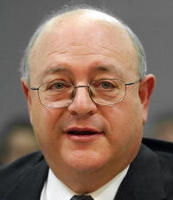UT chancellor formally accepts UC president post
March 28, 2008
Yudof, who served as UT chancellor for six years, formally accepted the job of overseeing California's prestigious 10-campus system today after the board of regents voted unanimously in favor of his appointment. A search committee had recommended Yudof for the post March 20.
Written by Lindsay Wise, The Houston Chronicle

Mark Yudof, chancellor of the University of Texas System, said "It isn't easy to leave Texas. But when push came to shove, I just felt that this was the place to be just because of the extraordinary, extraordinary quality of these campuses."
Mark Yudof will step down as head of the University of Texas System this summer to become the University of California's next president.
Yudof, who served as UT chancellor for six years, formally accepted the job of overseeing California's prestigious 10-campus system today after the board of regents voted unanimously in favor of his appointment. A search committee had recommended Yudof for the post March 20.
"It isn't easy to leave Texas," Yudof said. "But when push came to shove, I just felt that this was the place to be just because of the extraordinary, extraordinary quality of these campuses."
The 63-year-old legal scholar replaces noted physicist Robert Dynes, who announced his resignation in August after several audits found top UC administrators were receiving millions of dollars in questionable perks and extra pay.
Yudof's appointment breaks a historical pattern for UC, which usually hires its presidents internally.
"We did review the possibility of certain candidates from within the University of California System and certainly there are people that could've been a good president, but I think everyone on the search committee came to the decision we really needed institutional change, particularly at headquarters, and this is very difficult to do from within," said Richard C. Blum, chairman of the UC Board of Regents. "We really needed a professional who runs a tight ship."
The UC board voted to award Yudof an annual salary and compensation package valued at $828,000, compared to a current package of $775,000 at the University of Texas. Dynes, his predecessor at UC, earned $421,000 last year, according to the Chronicle of Higher Education.
"He's expensive but he's worth it," Blum said.
A long-time Texan, Yudof began his career at UT-Austin as a law professor in 1971. He later served as the university's Law School dean and executive vice president and provost, before leaving to become the president of the University of Minnesota for five years. In 2002, he returned to the UT System as chancellor.
For the next six years, he led one of the largest public university systems in the country with 15 campuses, including 9 academic and 6 health institutions, more than 194,000 students and an annual operating budget of $10.7 billion.
Under Yudof, the UT System made the largest capital investment in its history — $2.7 billion — to pay for equipment and construction. Yudof also successfully pushed to allow Texas universities to set their own tuition. The move increased costs for students, but infused the UT System with millions of dollars at a time when lawmakers were reluctant to commit state funds to higher education.
At the University of California, Yudof will oversee 10 campuses serving more than 220,000 students with an $18 billion annual budget. The UC system is widely considered the country's top collection of public research institutions.
"It's unusual to find a brilliant academic mind who has a vision for what a university can be and help it to grow, and also has a proven management track record," Blum said. "At the end of the day, the way you make this university grow and prosper is by having a really first-rate president and guess what? We lucked out."
![]()
![]()
Related Stories
![]()
Fair Use Notice
This site contains copyrighted material the use of which has not always been specifically authorized by the copyright owner. We are making such material available in our efforts to advance understanding of environmental, political, human rights, economic, democracy, scientific, and social justice issues, etc. We believe this constitutes a "fair use" of any such copyrighted material as provided for in section 107 of the US Copyright Law. In accordance with Title 17 U.S.C. Section 107, the material on this site is distributed without profit to those who have expressed a prior interest in receiving the included information for research and educational purposes. For more information go to: http://www.law.cornell.edu/uscode/17/107.shtml. If you wish to use copyrighted material from this site for purposes of your own that go beyond "fair use", you must obtain permission from the copyright owner.